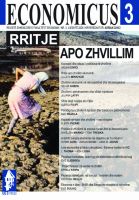Pronësia kombëtare, faktor kyç për efektivitetin e ndihmës së huaj
Country Ownership, Key Factor for Foreign Aid Efficiency
Author(s): Evis GjebrejaSubject(s): National Economy, Supranational / Global Economy, Economic policy, Developing nations, Economic development, Socio-Economic Research
Published by: Shtëpia botuese “UET Press”
Keywords: Country Ownership; Foreign Aid Efficiency;
Summary/Abstract: Nowadays “foreign aid efficiency” is the term we usually encounter while referring to the foreign aid that the developed countries (donors) give to the developing countries “beneficiaries” in order to assist the latter ones in having economic growth. This has become a question of great importance considering the global commitments made by developed and developing countries to reduce poverty by fifty percent by 2015. This is important since the developing countries have taken commitments concerning the meeting of long-term objectives, while in return donors are expected to provide great funds of foreign aid to support the meeting of these objectives. Consequently, the question to make is how to achieve foreign aid efficiency? There are a number of ways while the scope of this study is to determine one of the key factors, such as the country ownership, which is considered as the most challenging and important one. I purposefully mentioned the importance of this factor since it is a new concept and is a foundation for steady growth as well as influences donor’s decisiontaking process in providing foreign aid. Since the country ownership process covers a number of actors, special attention needs to be given to partnership at different levels, whose quality is determining to country ownership. Throughout this study, special attention will be given to the different ways of building country partnership with the aim of achieving country ownership. The first part explains the reasons of moving from aid under the conditions imposed by the donors towards the country ownership and partnership. The second part describes the ways of creating country ownership and partnership. The third part provides a case study from Ghana as a country of good experience. The fourth part provides a case study from Zambia as a country of not a very good experience. The last part presents recommendations and conclusions.
Journal: ECONOMICUS
- Issue Year: 3/2009
- Issue No: 1
- Page Range: 118-131
- Page Count: 14
- Language: Albanian

